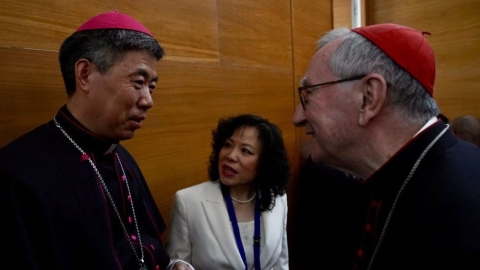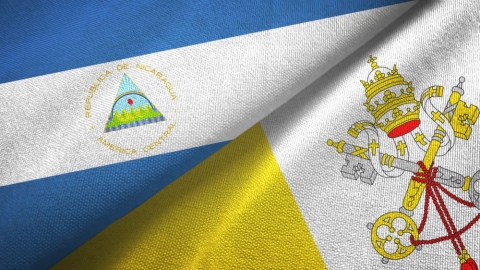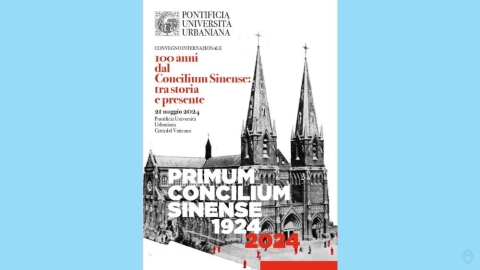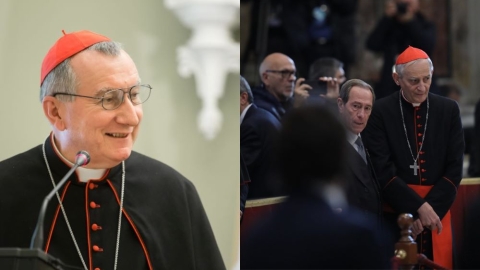Bishops From All Over the World Are Troubled By the Synodal Path

Third Assembly of the Synodal Way
More than 70 bishops from around the world have published a “fraternal open letter” to the German bishops, warning them that the radical changes in Church teaching they are advocating through the ongoing process of the Synodal Path could lead to schism.
The Synodal Path is a process, spread over several years, which brings together the German clergy - bishops, priests, deacons - and lay people, according to a parity of numbers, as many men and women as members of the clergy - in all more than 220 members, to discuss how power is exercised in the Church, sexual morality, the priesthood, and the role of women.
In February, the assembly voted in favor of draft texts calling for the blessing of same-sex couples and the modification of the Catechism of the Catholic Church on homosexuality. The first definitively approved text concerned the appointment of bishops with the participation of the laity.
Recently, in an interview published on March 31, Cardinal Reinhard Marx claimed that the catechism's teaching on homosexuality is “not set in stone” and “that it is also permissible to doubt what it says.” He had been preceded in the same vein by Msgr. Georg Bätzing, president of the German episcopal conference.
The first to show public concern were the Polish bishops. At the end of February, Msgr. Stanislaw Gadecki, president of the Polish episcopal conference, sent a very critical letter to his counterpart, Msgr. Bätzing. At the beginning of March, it was the turn of the Scandinavian bishops who published an open letter expressing their concern about the process taking place on their doorstep.
The new intervention brings together more than 70 bishops – and the list remains open – from various parts of the world. It expresses growing concern “about the nature of the whole German Synodal Path,” which the signatories say has led to confusion about the teachings of the Church and seems more focused on the will of man than on the will of God.
The letter is severe: “By not listening to the Holy Spirit and the Gospels, the actions of the Synodal Path undermine the credibility of the authority of the Church, including that of Pope Francis, Christian anthropology, and sexual morality, as well as the reliability of Scripture,” no less.
The inspiration of the movement is well identified: “Although they display an appearance of religious ideas and vocabulary, the German documents of the Synodal Path seem largely inspired, not by Scripture and Tradition… but by sociological analysis and contemporary political ideologies, including gender,” the letter continues.
In other words: “They look at the Church and her mission through the lens of the world rather than through the lens of the truths revealed in Scripture and the authoritative Tradition in the Church.”
The content is then severely judged. The letter sees “a flaw” in these texts: instead of expressing the “joy of the Gospel,” they bear the “obsessively critical and inward-looking” marks of a bureaucratic process primarily focused on something other than the salvation of souls.
“In fact,” observes the letter, “the synodal path shows more submission and obedience to the world and its ideologies than to Jesus Christ as Lord and Saviour. Authentic freedom is not synonymous with ‘autonomy,’ and a person's conscience does not determine truth.”
But the Synodal Path has strayed from the reality that “a properly formed Christian conscience remains subject to the truth about human nature and to the norms of a just life revealed by God and taught by the Church of Christ.”
In the same vein, with regard to questions relating to the governance of the institutional Church, the letter urges the German bishops to remember that “the reform of structures is not at all the same thing as the conversion of hearts.”
It notes that “Christian history is littered with well-meaning efforts that have lost their foundation in the Word of God, in a faithful encounter with Jesus Christ, in genuine listening to the Holy Spirit, and in the submission of our wills to the will of the Father.”
“Because they did not heed the words of Jesus: 'Apart from me, you can do nothing' (Jn. 15:5), they were fruitless and damaged the unity and evangelical vitality of the Church,” the letter reads. “The Synodal Path risks leading to such an impasse.”
The letter was published on Tuesday, April 12, 2022. Among its first signatories are 49 bishops from the United States, and nineteen from Africa, including 14 from Tanzania. The letter's sponsors have provided an email address that other bishops can use to sign.
Among those who have signed are four cardinals: Francis Arinze, Raymond Burke, Wilfried Napier, and George Pell, and numerous archbishops. Some had already been critical of the Synodal Path, such as Archbishop Samuel Aquila of Denver, who published a 15-page commentary on the first text of the Synodal Path in May 2021.
He asserted that “the German bishops are sowing confusion throughout the Church and this should worry all bishops.” Another prelate who signed the letter, Bishop Thomas Paprocki of Springfield, Illinois, issued the following statement:
“The German Synodal Way has moved away from authentic synodality and has put itself in opposition to the truths of the Catholic faith, taught over the centuries by Scripture and Tradition. In a fraternal correction and in union with the bishops of the whole world, I encourage the bishops of Germany to return to the true deposit of faith as transmitted to us by Jesus Christ.”
This reaction is reassuring, because it shows that some bishops still have enough Catholic principles to react to a movement which, from its beginning, showed the most disturbing signs of a schismatic tendency (Cf. the file of FSSPX.News).
At the same time, it is worrying, because it is from Rome that a reaction should have come. But the only Roman elements in this affair were the April 2019 reaction by Benedict XVI, who quickly understood the danger. Then the Letter to the Pilgrim People of God in Germany by Francis, sent in June 2019, which did not resolve not much.
The Congregation for Bishops expressed concern about the draft Statutes of the Synodal Path, and Cardinal Marc Ouellet sent a letter to Cardinal Marx to warn him, with an analysis by the highly critical Pontifical Council for the Interpretation of Legislative Texts. The German cardinal's reply was, to be polite, very curt.
Then nothing. Except unofficial items. Msgr. Gadecki reported that Pope Francis used the term “the so-called German Synodal Path” to designate the Synodal Path. Revealed by the Polish bishops, these remarks were put into perspective by a press release from the Vatican.
Does this mean that Francis wants to see the solution to this major crisis in the Church of Germany coming from the “periphery”? Or does he feel unable to remedy it? Or does he not want it?
These questions are pressing. Especially since the principles laid down since Vatican II, and amplified by the current pontificate, in particular on the ecclesiology of communion and synodality, will not really make it possible to resolve this crisis. What will happen? a latent or even open schism in a powerful Church having influence over many local Churches.
(Sources : InfoCatolica/CNA – FSSPX.Actualités)
Illustration : © Synodalerweg.de





